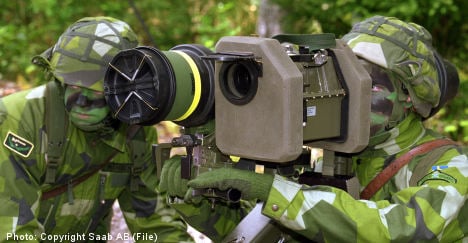Saab Bofors Dynamics will neither confirm nor deny the report, which surfaced late Thursday night on the website of the financial daily Dagens Industri (DI).
Saab Group spokesperson Peter Liander also remained tightlipped about the deal.
“We can neither confirm nor deny that we’ve sold weapons to Saudi Arabia,” he told the TT news agency.
Prime minister Fredrik Reinfeldt denies that his government had any knowledge of selling weapons to Saudi Arabia, claiming that a decision about the deal was taken well before he became prime minister.
“This is a decision which took place a long time ago. According to the information I’ve received, it’s as far back as 2002,” Reinfeldt told the TT news agency.
He went on to explain that trade minister Björling wasn’t aware of the deal because it was decided under a previous government.
Andreas Ekman Duse, the head of the Swedish Agency for Non-Proliferation and Export Controls (Inspektionen för strategiska produkter – ISP), told TT that he can’t comment on the matter and directed all questions to the company.
According to DI, Saab announced it had received two export orders in December 2007, one of which involved the BILL 2 anti-tank missile.
At the time, Saab chose not to release the name of the buyer.
But several independent sources told the newspaper that the buyer is the Kingdom of Saudi Arabia, marking the first time that a Swedish defence company has sold combat materiel to the country.
In the wake of the revelations, opinion remains divided over exactly who within the Swedish government is responsible for the matter.
A spokesperson for defence minister Sten Tolgfors told TT the deal falls under the purview of trade minister Ewa Björling.
But Monica Ohlsson, a spokesperson for the trade minister, claimed the matter was the sole responsibility of the independent ISP, which makes assessments of individual deals.
“ISP can also decide to pass along matters of fundamental importance to the government, and for those sort of matters Carl Bildt is responsible,” said Ohlsson, adding that Björling hadn’t received any information about a deal between Saab and Saudi Arabia.
In a statement, ISP explains that during the last ten years the agency has assessed a number of requests to export defence-related material to Saudi Arabia and that some requests have been approved and some have been denied.
According to ISP statistics on Swedish arms exports from March of this year, Saudi Arabia was one of the countries which received combat-related materiel from Sweden. The exports were grouped in two classifications, one which encompasses “missiles, rockets, torpedoes, bombs, etc.” and another which includes equipment for controlling and guiding, and which can be used to control missiles.
Anna Ek, secretary general of Swedish Peace and Arbitration Society (SPAS), said that the revelations show it’s high time to put democratic criteria into Swedish regulations on weapons exports.
“We have long suspected that exports to Saudi Arabia, which have increased from year to year, will pave the way for wide-ranging weapons exports,” she told TT.
Left Party leader Lars Ohly said that, if the information about the Saudi arms deal is true, that is a “clear breach of a Riksdag decision”.
“If the government thinks we should have these types of deals with one of the worst dictatorial regimes in the world, then they ought to defend it out in the open,” said Ohly.
Foreign minister Carl Bildt told TT that he hadn’t made any decision about the sale.
“It’s clearly an old permit from 2002. In sensitive cases, it’s up to the government to decide and therefore it would come to me. And in this matter it hasn’t come to me. To the extent that it was referred to a government, it was referred to a previous government,” said Bildt.
Bildt refused, however, to comment on the deal specifically.
“For the simple reason that it’s an old permit from ISP which was granted by a parliamentary commission.”



 Please whitelist us to continue reading.
Please whitelist us to continue reading.
Member comments